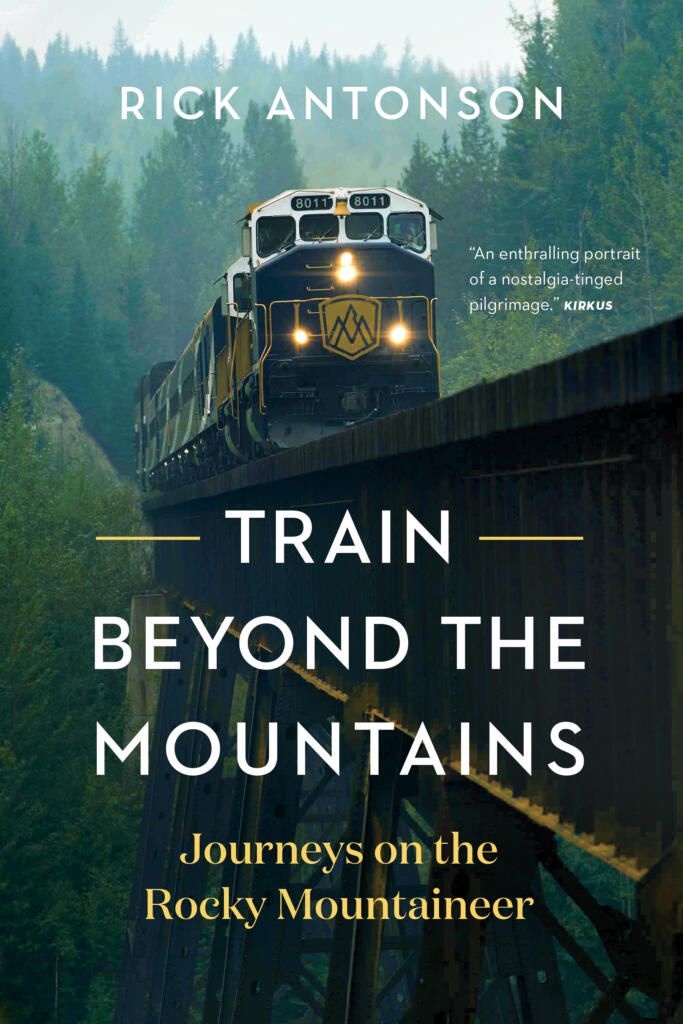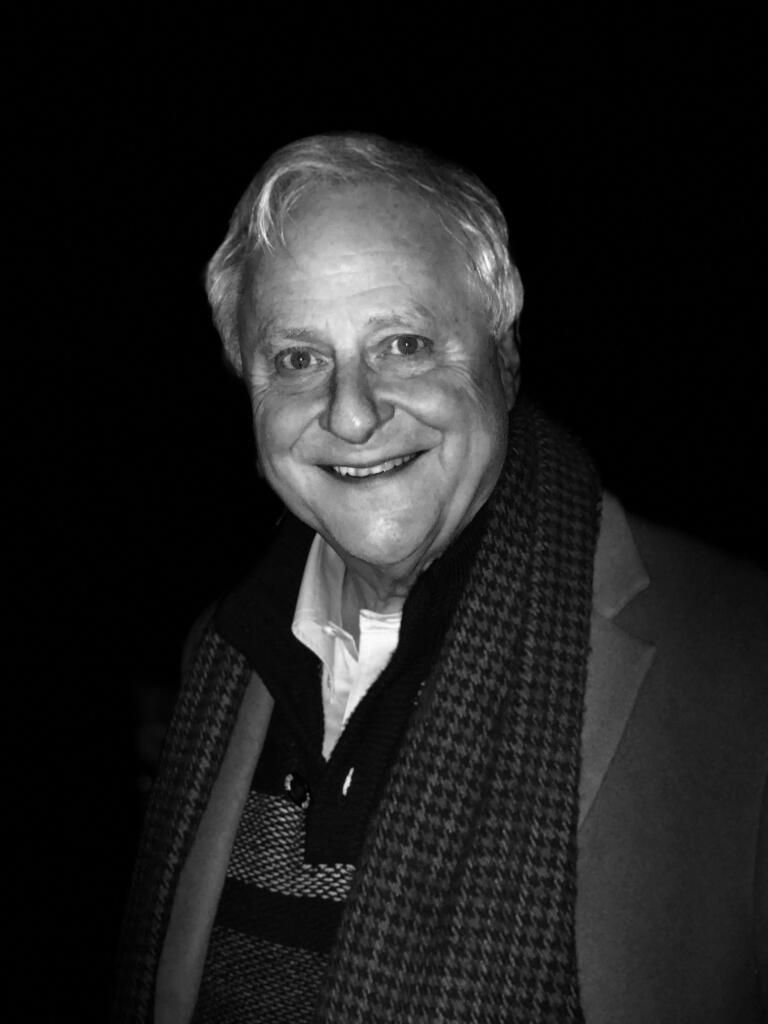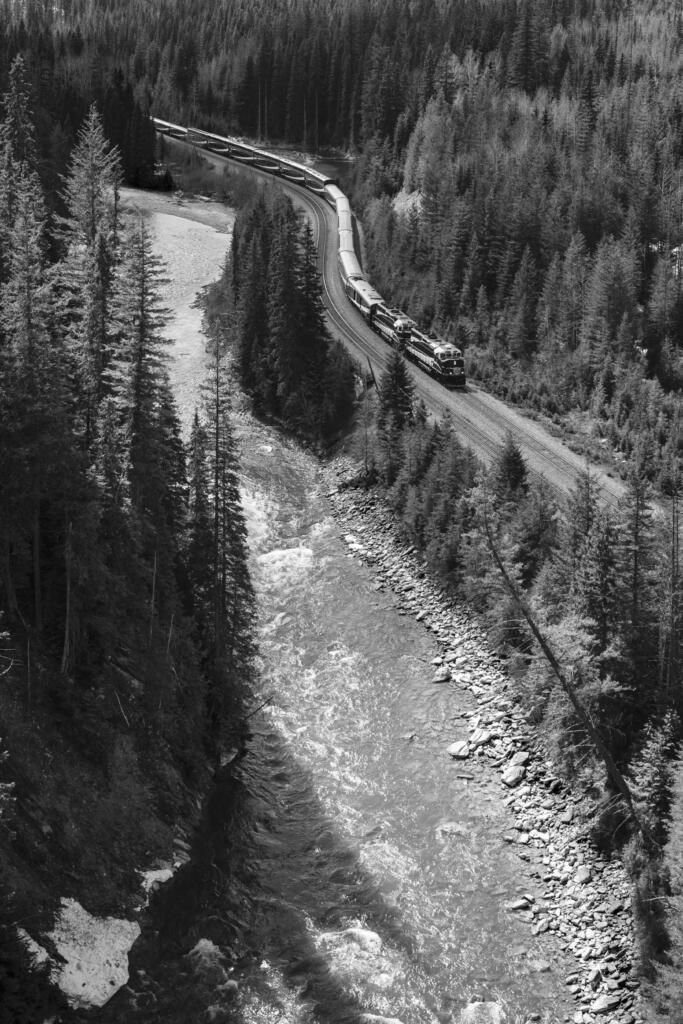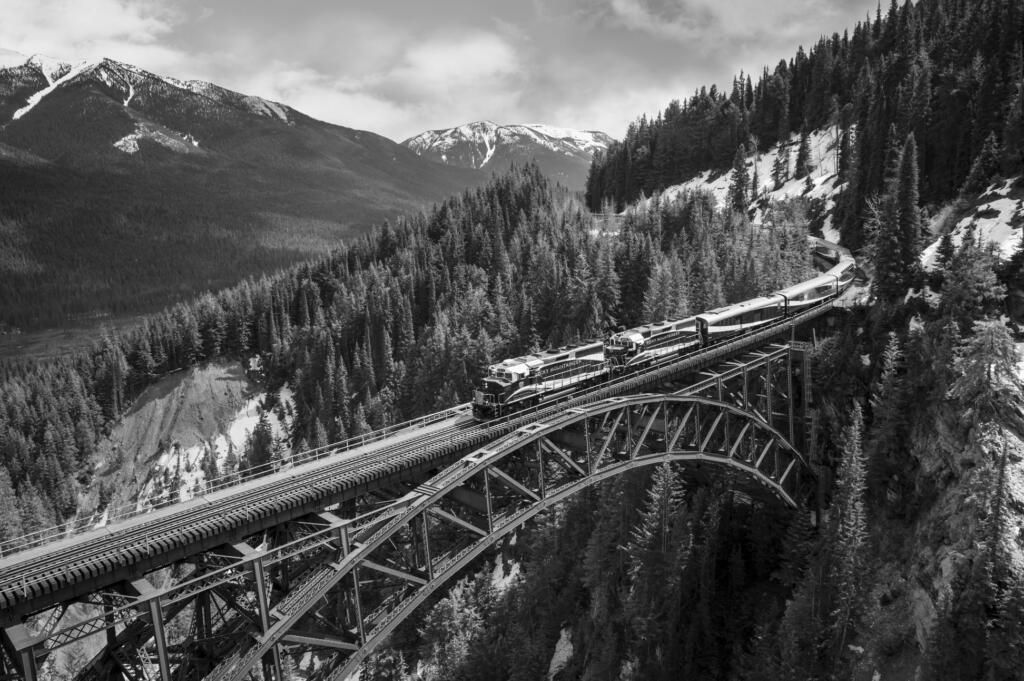Travel, history on the rails
Train Beyond the Mountains: Journeys on the Rocky Mountaineer
by Rick Antonson
Vancouver: Greystone Books, 2023
$34.95 / 9781771644860
Reviewed by Natalie Virginia Lang
*

“Some trips are too special not to share.”
As the former vice-president of Rocky Mountaineer, former president and CEO of Tourism Vancouver, previous chair of the board for Destinations International (Washington, D.C.), and vice chairman of the Pacific Asia Travel Association (Bangkok, Thailand), Rick Antonson knows travel. Often a solo explorer, he has spent much of his life circumnavigating the globe. Many of those journeys can be found in Antonson’s accomplished collection of memoirs, detailing adventures that took him to places like West Africa, Papua New Guinea, and Turkey. He has also contributed to books outlining the search for lost gold and rugged travel across Canada. It is a train trip on the Rocky Mountaineer, from Banff to Vancouver, then to Whistler and ending in Jasper, with his ten-year-old grandson, that guides Antonson’s newest memoir.

Photo Riley Antonson
In Train Beyond the Mountains: Journeys on the Rocky Mountaineer, Antonson takes us on a trip through time as he recounts a multi-day excursion on historic train, the Rocky Mountaineer. The memoir details the incredible landscape and mountainous ranges that are wholly unique to Canada. Such sights are considered by many, including those Antonson and his grandson spoke with while on their journey, to be some of the most spectacular in the world. For Antonson, though, the voyage and views one encounters through the train’s glass dome tops, or the windblown viewing areas on the train’s platforms, are only small pieces of the larger story.
Antonson begins his tale in the prologue, with a geology lesson. The formation of the Canadian Rocky Mountains as we know them today, and subsequently the route that the Rocky Mountaineer takes from Banff to Vancouver, could only have existed because of “monumental periods of glaciation.” It is in the prologue where Antonson nods to the dwindling glaciers that made the Rockies what they are.

From there, in the section titled “Junctions,” he begins the story of his trip with his grandson, Riley, by describing a romantic experience of train travel lost to time and only truly existing in stories and films where the roaring ‘20s take the stage. It was at this time, Antonson explains, when the Mountaineer began. Starting in Chicago, the route went across the great plains and into Canada where it traversed the Rocky Mountains before reaching its terminus in Vancouver.
The modern route for the Mountaineer took Antonson and his grandson Riley from Banff to Vancouver, then north to Whistler, before ending in Jasper. While those who have run the train as a business had experienced many challenges, changes, and financial setbacks, it is evident that there is a certain golden-age tinge to all things trains that keep people coming back, wanting to experience something of the past, that no longer exists anywhere else.
Those who travel by train today, are not the same “[s]ophisticated women in long dresses or twill suits.” Gentlemen don’t don “[b]roadway hats and moleskin coats.” Even the steam and whistle so representative of trains and steam engines at the height of train travel throughout the world, have been modernized by new forms of fuel and technology. Yet there is something about trains that continues to draw enough fascination for companies to promote a once in a lifetime experience and for guests to buy into that experience. For Antonson, this fascination exists in three ways— a connection to historical pasts, a mindful intention to slow down in a hectic and distracting world, and a chance to pass on wisdom and learn from the younger generation.

Throughout the book, Antonson recounts the history of trains and train travel across the globe. He describes famous trains and routes that have made their way into popular culture and cinematic history, like The Orient Express. Yet, despite these great trips one can take in places like Australia, Mongolia, and Europe, Antonson maintains, backed up by the voices of fellow travellers, that the Rocky Mountaineer is special—a route unlike any other.
Antonson spends time threading Canadian history of train travel, and the laying of the railroad from coast to coast, into the venture he takes with his grandson. He includes anecdotes about the men who traversed mountain ranges in search of a pass that would lead to the ocean, and those who went looking for great rivers, or gold, or found ways to tame the harsh and dense Canadian wild. He tells about the men who came from across the globe for work and the dream of prosperity that Canada promoted, nodding to the displacement of Indigenous people and loss of lands along the way, and mentions the women who refused to be left behind. Train Beyond the Mountains is as much a travel tale as it is a history lesson about how Canada became one, and who helped to make it happen.

Photo Rick Antonson.
Beyond the history of the Rocky Mountaineer and its tracks, though, is something much more intentional. Part of the allure, according to Antonson, of modern train travel today, is the slowness it requires. One who travels by train, cross-country, is bound to that train. As such, there is not much to do but lean into its slowness. Antonson and his grandson Riley take their time in watching the world pass by, in contemplating themselves and each other, and in chatting idly with fellow passengers and the train’s crew members. For those with the privilege of time, train travel is one way to ensure a slowing down of all things, and to make room for introspection and connection with the self and those around us; a lesson Antonson works at passing along to Riley, who in turn teaches his grandfather a thing or two along the way.

Photo courtesy of Rocky Mountaineer.
A self-proclaimed cathedral thinker, perhaps Antonson’s larger goal in taking a trip on the Rocky Mountaineer, and in bringing his grandson along for the ride, is to bestow wisdom upon the younger generation. The premise behind cathedral thinking is that the big ideas are always present in mind, and one works today for their vision of the future to come true many years down the road. It is about learning how small steps move one closer to a better tomorrow. For Antonson, the goal, then, of train travel, isn’t just to get people from place to place. It is an intentional choice to slow down, to learn from the new generations and the old, without judgement or resentment, in hopes of setting a foundation for a stronger future yet to come.
*

Natalie Virginia Lang is a teacher and writer. She is an alumnus of the Graduate Liberal Studies (GLS) program at SFU and has contributed essays to The B.C. Review including Remnants of Sumas Mountain and Letters from the Pandemic: Dear Will. Lang is the author of Remnants: Reveries of a Mountain Dweller (Caitlin Press, 2023), a memoir inviting readers to re-examine our relationships with the natural world.
*
The British Columbia Review
Interim Editors, 2023-24: Trevor Marc Hughes (non-fiction), Brett Josef Grubisic (fiction)
Publisher: Richard Mackie
Formerly The Ormsby Review, The British Columbia Review is an on-line book review and journal service for BC writers and readers. The Advisory Board now consists of Jean Barman, Wade Davis, Robin Fisher, Barry Gough, Hugh Johnston, Kathy Mezei, Patricia Roy, Maria Tippett, and Graeme Wynn. Provincial Government Patron (since September 2018): Creative BC. Honorary Patron: Yosef Wosk. Scholarly Patron: SFU Graduate Liberal Studies. The British Columbia Review was founded in 2016 by Richard Mackie and Alan Twigg.
“Only connect.” – E.M. Forster
2 comments on “Travel, history on the rails”
Hi Natalie,
Your very thoughtful review of my new book Train Beyond the Mountains means a lot to me, and I know your approach will resonate with readers of the British Columbia Review, an audience I greatly respect. Your style makes it easy to move along with your telling, as though on a journey with words, and I liked that ease and depth and comfort as well as how you conveyed an informative overview. Writers need readers, and I believe your review will help find more, which is certainly appreciated. Thank you for all that.
Rick